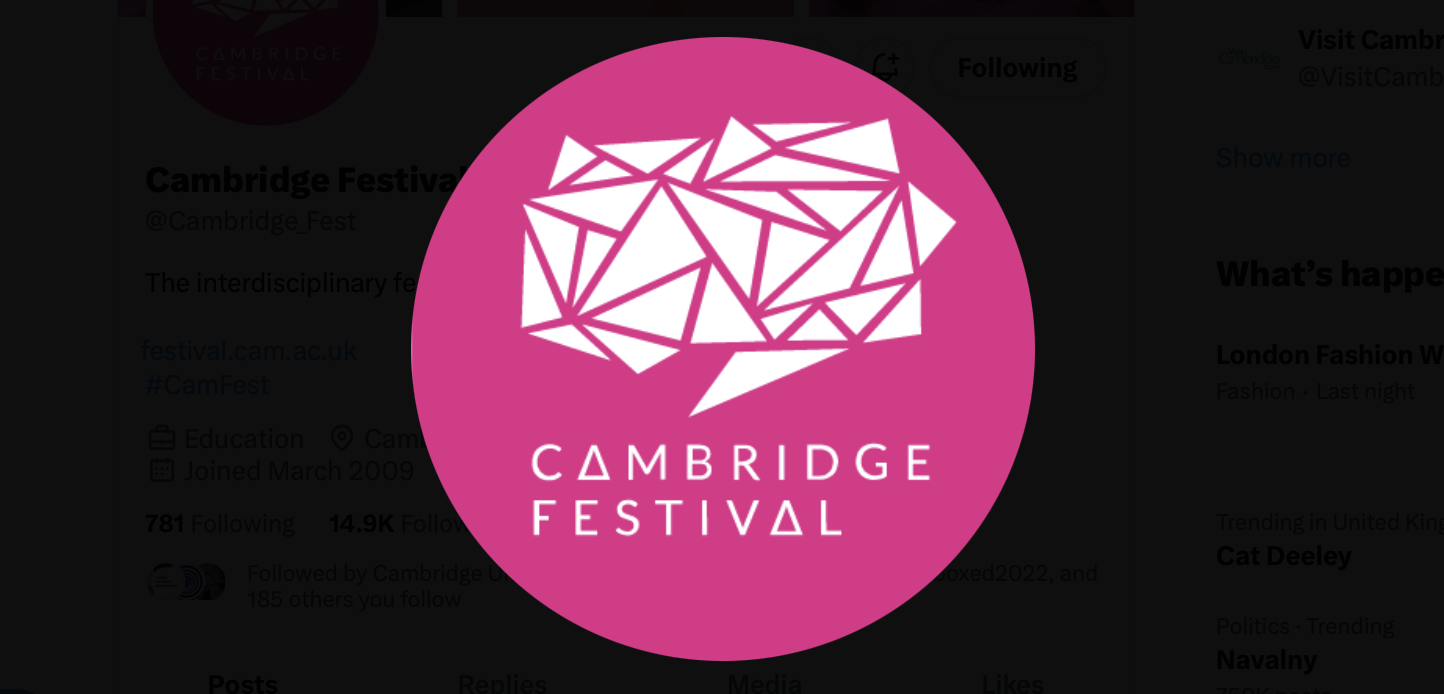
This year's Cambridge Festival programme has just launched, featuring several exciting events led by members of the Faculty of Music:
14 March: Music, Healing and Human Rights As part of a larger project, curated by Elizabeth Carmack, on the theme of music, healing and human rights, this performance by St Catharine’s College Choir, directed by Affiliated Lecturer in Music, Dr Edward Wickham, features premieres of works by three of the UK's most distinguished composers: Errollyn Wallen (Mistress of the King's Music, and Cambridge alumna), Richard Causton (Professor of Composition at the University of Cambridge) and Howard Skempton. The commissions address diverse issues including intersectionality and systemic prejudice, loss of freedom of speech in failing democracies and LGBTQ rights, and will be premiered alongside other works by the same composers. In each case, the works will be introduced by the composers themselves.
20 March: Sephardi Ottoman Majlis: Listening Party from the foremost Ottoman Sephardi 78 collection In the early 20th century phonographic technology traveled into many living rooms, cafes and even courtyards making what had been repertoires of closed communities available across linguistic and religious divides. Joel Bresler has been collecting 78s from the Ottoman Empire's Sephardi communities for forty years. Together with Musicologist Dr. Vanessa Paloma Elbaz (Faculty of Music) and Linguist Prof. Ioanna Sitaridou, this event will trace the networks of recording and technology together with linguistic information and shifts, and the politics of voice and listening in the late Ottoman empire. Core to the event will be listening to previously unavailable recordings from Bresler's collection.
21 March: electro//acoustic day Now in its second year, the electro//acoustic day brings together exceptional musicians performing both classical instrumental and vocal repertoire alongside cutting-edge electronic music, embracing non-traditional ways of experiencing sound to create new relationships between music, tradition, and innovation. The sonic and physical space, spatialization, and embodiment of sound are central to the event, spanning three concerts, a sound-visual installation, a poetry reading, and a dance performance—all designed to create an immersive experience. The fusion of digital media with acoustic instruments highlights the incredible diversity and potential of contemporary creative expression—an artistic synergy that the Faculty of Music and The Cambridge Festival, with the support of King’s College, are proud to host.
23 March: Beyond Rainbows: Messiaen's Quartet for the End of Time This concert, curated by Dr Jeremy Thurlow (Robinson College), presents Messiaen’s extraordinary Quartet for the End of Time: it's a work that contemplates an apocalyptic vision of earth, sea and sky utterly recast, a radical transformation of our entire world, at once terrifying and inspiring. Composed in a WWII POW camp, the music acquires new and urgent layers of meaning as we confront existential environmental changes in our own time. Also inspired by our fragile climate, music by Cambridge-based composers Cheryl Frances Hoad and Jeremy Thurlow completes the programme. The concert will be preceded by a conversation on climate awareness and the arts featuring Zoe Svendsen (climate writer and director), Cheryl Frances Hoad (composer) and John Fanshawe (Cambridge Conservation Initiative), chaired by Iza Kavedžija (Department of Social Anthropology).
26 March: Music & Words: Humans [with/in/and/vs/or] Nature Through music and writing, from a diverse and often contradictory set of sources ranging from the very ancient to the as yet unwritten, the Inter Alios Choir, led by Dr Ewan Campbell, Director of Music at Murray Edwards and Churchill College, examine, inexactly and holistically, the coexistence of humans and nature.
29 March: ‘Discovering the piano works of Russian composer Valentina Serova (1846–1924)’ Led by PhD student Nicholas Ong (Clare College), this lecture-recital explores the life and works of Valentina Serova, a prolific musical figure who has largely been written into obscurity. Focused around Servoa's Nine illustrations for piano based on stories by L. Tolstoy, and a suite of piano pieces compiled by Serova based on sketches for her husband's unfinished opera Christmas Eve, this event will give audience members the opportunity to learn about the socio-political and personal events that impacted Russia’s musical world and Serova’s life, and to experience the piano works which have (possibly) never been publicly performed beyond the territories of the Russian Empire!



